
AI is no longer optional - it’s essential. By 2026, businesses will rely heavily on AI to streamline operations, cut costs, and boost efficiency. The challenge? Choosing the right tools to avoid "tool sprawl" and maximize value. Here’s a quick breakdown of top AI platforms transforming workflows:
These tools focus on interoperability, automation, and integration, helping businesses reduce manual effort and improve productivity. Whether you need enterprise-grade AI orchestration or simple task automation, there’s a solution to fit your needs.
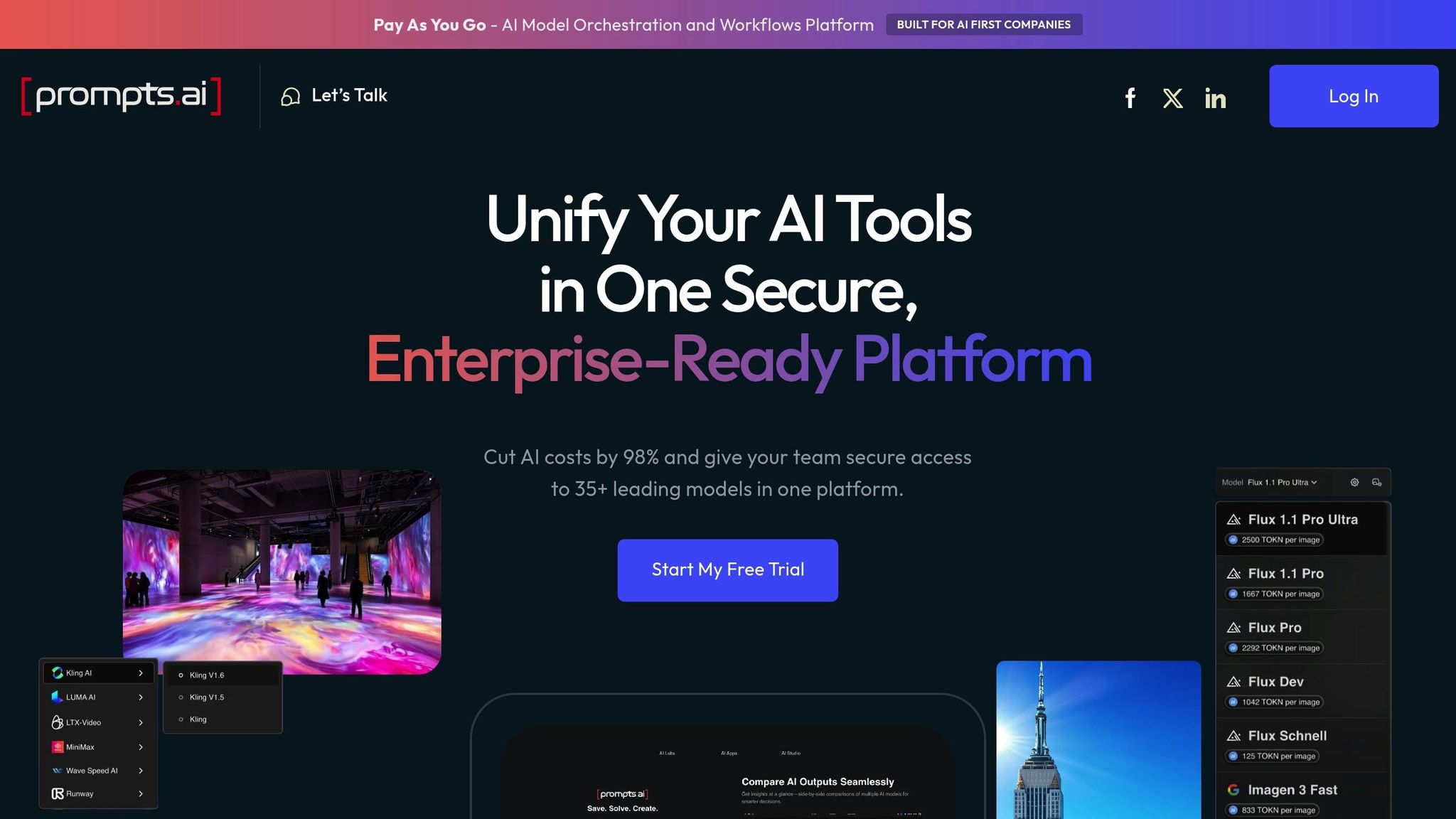
Prompts.ai is an AI orchestration platform designed to simplify the challenges of managing multiple AI tools, controlling costs, and ensuring security. Instead of requiring businesses to juggle numerous AI subscriptions, it brings together over 35 top-tier large language models - like GPT-5, Claude, LLaMA, and Gemini - into one secure, centralized interface. This consolidation creates a streamlined foundation for efficient operations.
Organizations using Prompts.ai have reported cutting their AI-related expenses by as much as 98%. This is achieved through its pay-as-you-go TOKN credit system, which eliminates recurring subscription fees. By tying costs directly to actual usage, businesses gain better financial clarity and a stronger ability to justify their AI investments.
Prompts.ai is designed to work seamlessly with a variety of AI models through standardized APIs. This flexibility allows businesses to integrate their existing AI-powered platforms, CRMs, ERPs, and analytics tools without requiring significant system changes. For instance, a company can deploy one model for customer engagement while simultaneously using another for advanced data analysis, all within a single, unified workflow. According to Gartner, by 2026, 40% of enterprise applications will incorporate task-specific AI agents, a significant rise from less than 5% in 2025.
Built on cloud-native infrastructure, Prompts.ai supports rapid scaling, making it easy to move from pilot projects to full-scale production. Businesses can add new models, users, and teams in minutes, even as data volumes grow and workflows become more complex. This scalability pairs seamlessly with the platform’s powerful automation features.
Prompts.ai leverages autonomous AI to manage complex, multi-step processes. Whether it’s prioritizing customer support tickets or conducting compliance checks, the platform simplifies intricate workflows. Companies using similar automation tools have experienced up to a 7 percentage point improvement in forecasting accuracy while reducing manual effort.
The platform includes pre-built connectors and customizable APIs to integrate effortlessly with widely used business systems like Salesforce, Jira, SAP, and Microsoft 365. It also supports legacy system integration, ensuring compatibility with existing infrastructure. Whether deployed in the cloud or on-premises, Prompts.ai offers the flexibility to meet diverse organizational needs.
With real-time FinOps cost controls and side-by-side performance comparisons, businesses can optimize their AI spending while maintaining full transparency. Its governance framework - featuring audit trails, access controls, and compliance monitoring - is particularly valuable for industries with strict regulatory requirements, where legal liability and data privacy are critical.
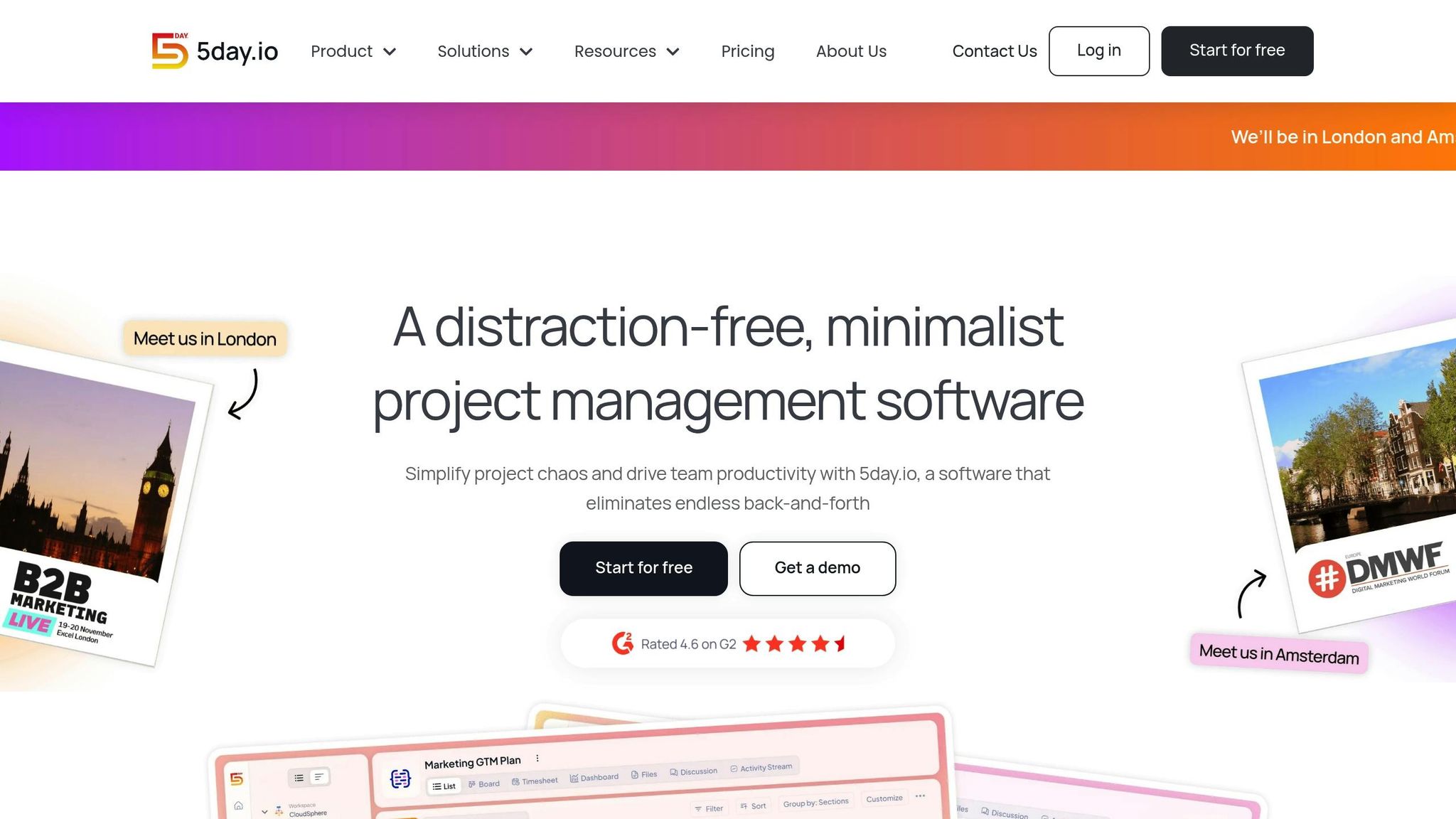
5day.io takes a modern approach to project management by blending simplicity with AI-driven efficiency. As a streamlined project management platform, it merges traditional tools with built-in AI to simplify operations and eliminate the chaos often associated with managing multiple projects. Its intuitive design and automation features make it a go-to solution for teams looking for functionality without unnecessary complexity.
One of its key features is 5day AI, which automatically generates clear, concise task and project descriptions. This ensures teams stay aligned, reducing misunderstandings that can lead to delays or missteps. By focusing on clarity, the platform enables smoother collaboration and automates repetitive tasks with ease.
5day.io tackles a common hurdle in today’s workplaces: time-consuming routine tasks that sap productivity. By automating these tasks, the platform frees up teams to focus on more strategic goals. Everything - tasks, team discussions, documents, and analytics - is centralized, offering a clear view of project progress and minimizing the risk of losing critical information.
The platform also helps businesses manage resources more effectively. By distinguishing between billable and non-billable work, it supports better resource allocation and provides insights for cost analysis. Real-time notifications ensure teams stay updated on project changes without overwhelming them with unnecessary alerts.
"With 5day.io platform, project management has become a lot easier for us. It helps us to track the performance of individual teams by means of project delivery within stipulated timelines. They have made the process approval thing easier so that important releases don't get stuck in between stages." - Tushar Chakote, CTO, CloudOptimo
5day.io enhances its utility by offering seamless integration with existing tools, particularly Google Drive as part of Google Workspace. This integration streamlines task allocation and file management, making it easier for teams already using Google Workspace to collaborate. Users can attach documents directly to tasks, keeping everything neatly organized within one platform.
"Integration with Google drive makes task allocation and monitoring really easy. I have used multiple tools earlier like Trello, Notion, Jira. 5day.io stands out with its clean and simple UI, and just the features we wanted for our projects." - Sumit Saxena, Founder, Merren.io
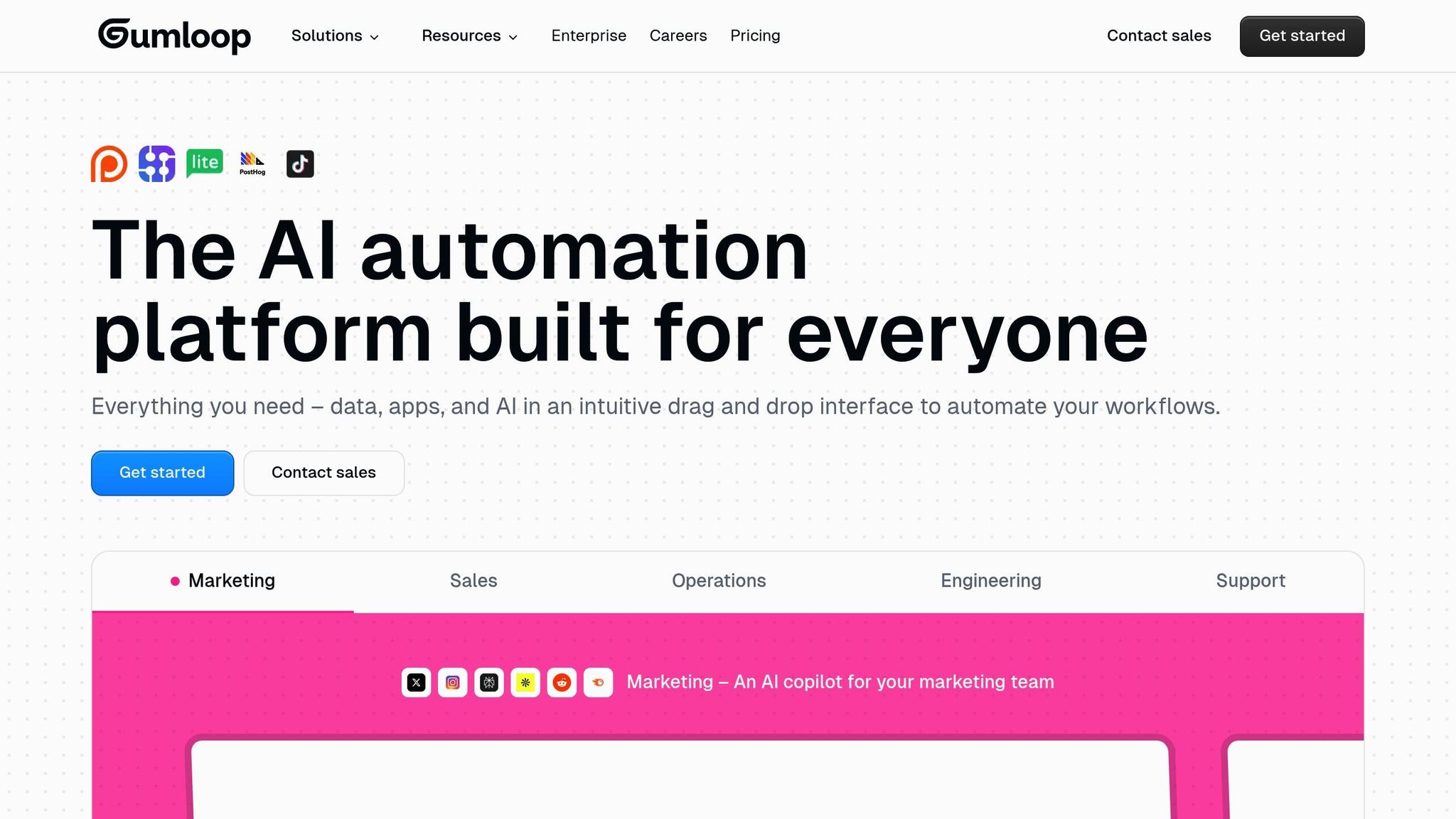
Gumloop stands out as a tool designed to simplify AI-driven workflows, particularly in business process automation. Named the "Best AI Workflow Builder for Business Process Automation", it empowers users to automate complex processes without needing advanced technical skills.
Gumloop uses AI to craft workflows that reduce the need for manual effort, helping businesses streamline operations and focus on more strategic tasks.
With pricing options ranging from free to $244 per month, Gumloop caters to small teams while offering scalability for businesses as they expand.
While specific integration details aren't widely available, Gumloop is built to work alongside existing tools, enhancing its value within diverse tech environments.
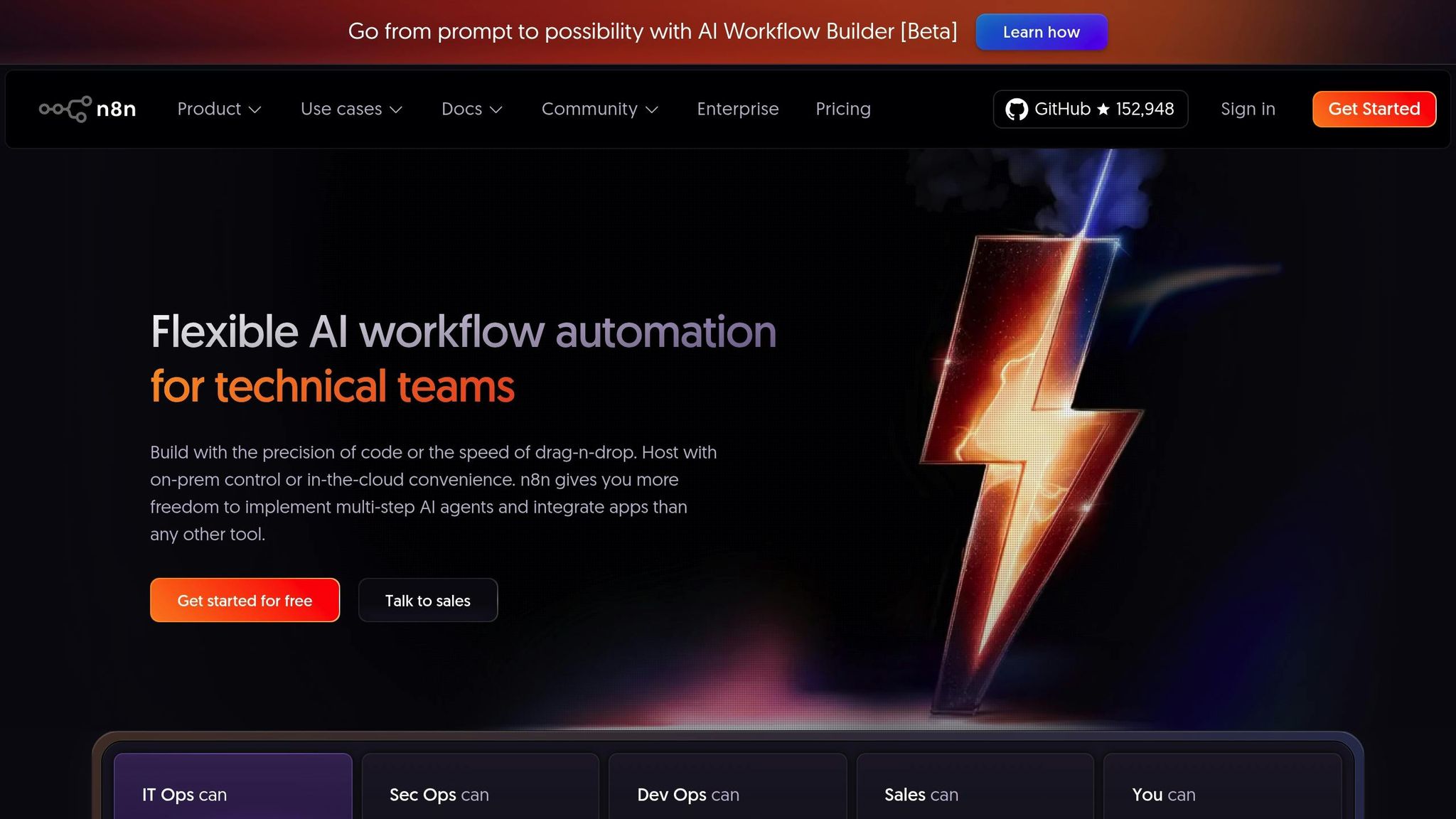
n8n is an open-source platform that bridges AI models with business workflows. Its open design ensures businesses can integrate any AI service or model without being tied to a specific vendor.
n8n’s open-source framework allows it to connect with a wide range of AI tools, from natural language processing models to computer vision APIs. With pre-built nodes, custom API connections, and webhook triggers that react instantly to new data, it offers a solid foundation for advanced automation workflows.
This platform excels at managing intricate workflows by handling complex decision trees, routing data based on AI insights, and incorporating error-handling mechanisms to ensure smooth operations. Its visual workflow editor makes it possible for teams to design sophisticated automation processes without needing extensive coding expertise.
n8n caters to businesses of all sizes with flexible deployment options. The free self-hosted version provides full functionality and complete control over automation systems. For organizations looking to scale, cloud plans are available with a base fee and usage-based pricing, ensuring businesses only pay for what they need.
With support for custom code, n8n enables businesses to connect legacy systems with modern AI capabilities. Its event-driven automation processes can respond to triggers from existing systems, analyze information through AI models, and seamlessly integrate the results back into operational workflows, enhancing efficiency without disrupting established processes.
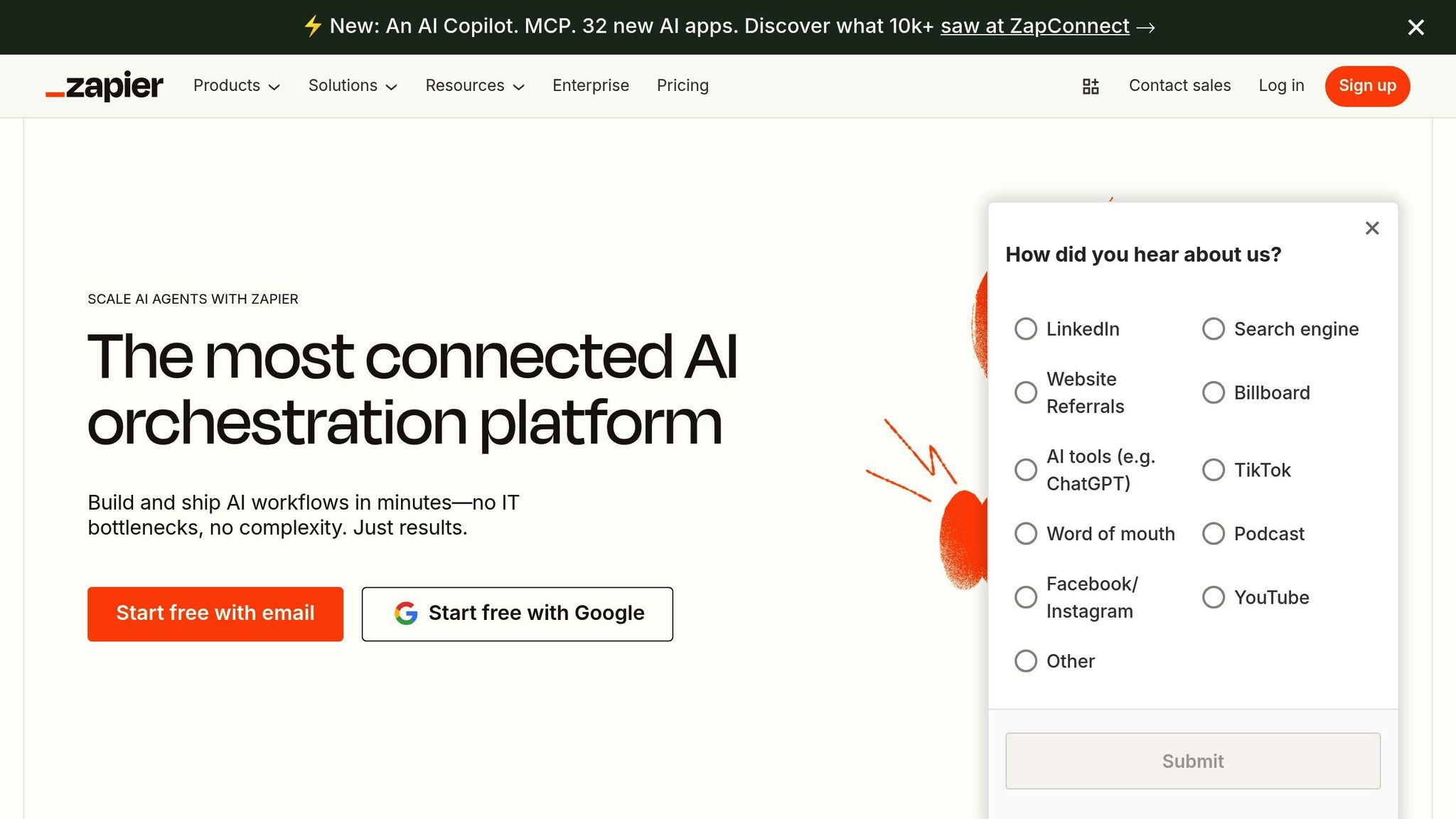
Zapier is a platform designed for no-code automation, enabling users to connect different applications and automate repetitive tasks. With its user-friendly interface, teams can easily set up custom workflows, simplifying operations and cutting down on manual work. Known for its straightforward functionality, Zapier helps businesses improve efficiency by integrating smoothly into existing processes. This approach complements the focus on creating interoperable AI workflows tailored to today’s business needs.
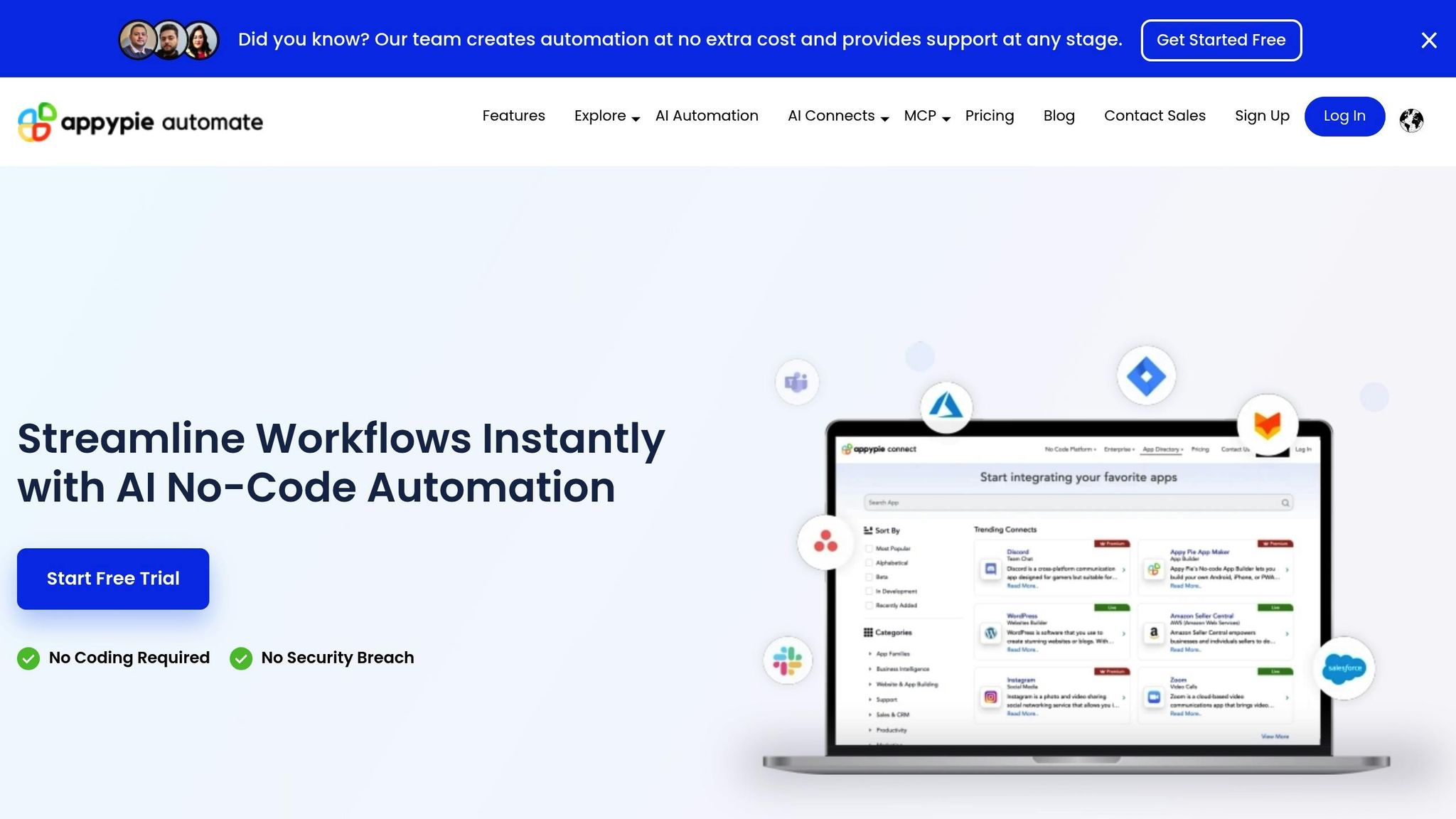
Appy Pie Automate is a no-code platform that makes creating efficient workflows accessible to everyone, regardless of technical background. Tailored for teams in marketing, sales, operations, and customer service, it features a visual workflow builder where users can simply drag and drop elements to design workflows that streamline business processes.
With its intuitive automation engine, Appy Pie Automate takes the hassle out of repetitive tasks. The platform uses conditional logic and branching to create multi-step workflows that adapt to changing conditions, like new inquiries or data updates. For instance, in customer service, high-priority tickets can be automatically routed to senior staff, while routine queries receive automated responses. This approach not only improves task management but also ensures smoother operations as businesses grow.
Appy Pie Automate is designed to grow alongside your business. Small teams can start with basic automation and gradually build more complex workflows as their needs evolve. The platform’s robust processing power and flexible pricing options support enterprise-level demands, enabling organizations to handle larger workloads without additional infrastructure. Even during peak activity, the system maintains consistent performance, managing numerous active workflows with ease.
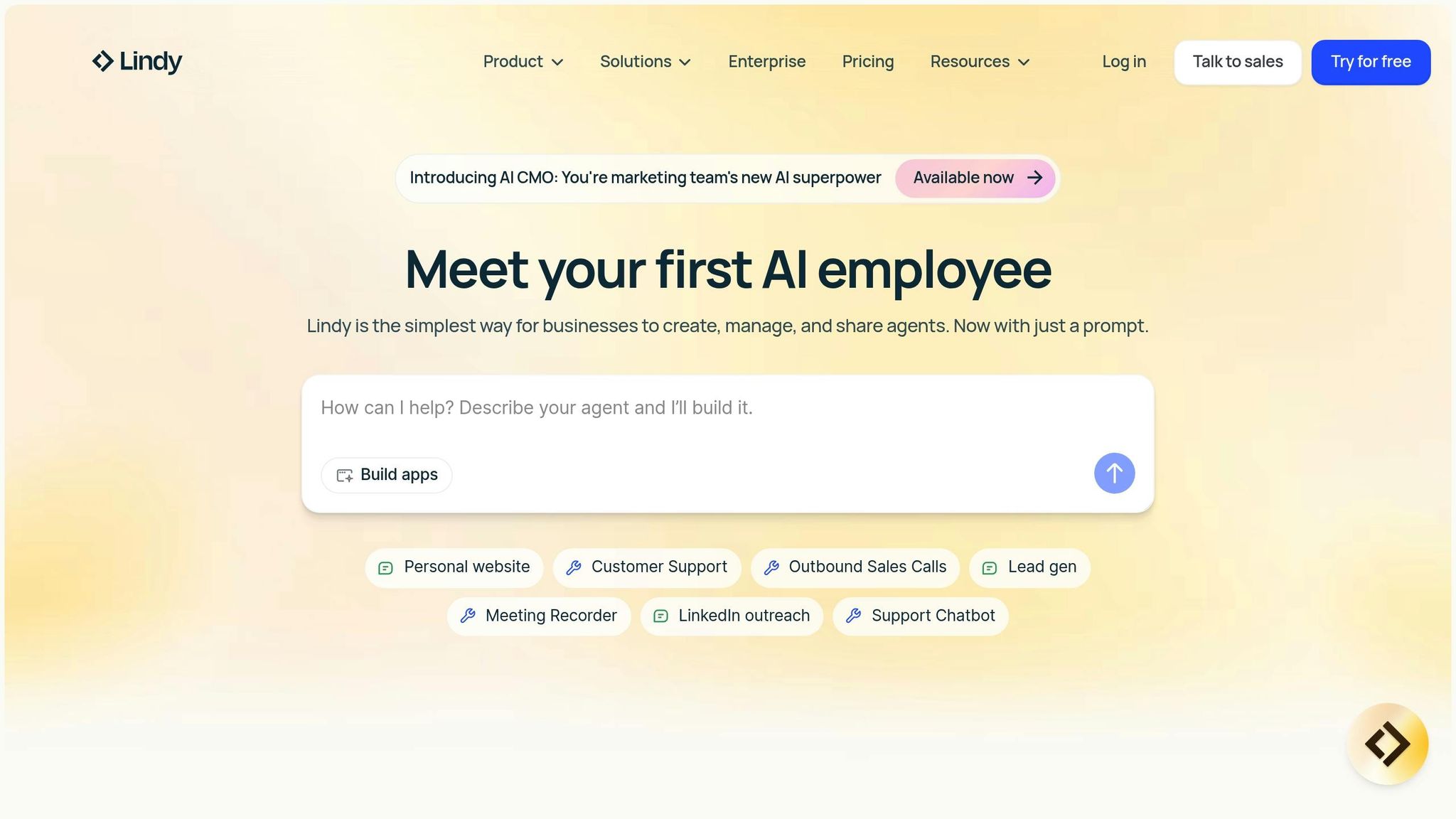
Lindy.ai is a versatile platform designed to help businesses create custom AI agents through simple prompts. By offering access to multiple top-tier AI models, it eliminates the risk of vendor lock-in. Its adaptable design ensures seamless compatibility with various AI tools and systems.
Lindy.ai breaks down barriers by allowing businesses to use different AI models tailored to specific tasks - whether it's natural language processing, data analysis, or managing decision-making workflows.
The platform supports Multi-Agent Systems, where specialized agents collaborate to tackle intricate challenges. Additionally, its multi-trigger workflows enable AI actions to be automatically initiated by events from connected tools, streamlining operations.
With thousands of integration options, Lindy.ai connects effortlessly to virtually any business application or system. It continuously ingests data from sources such as Google Drive and Notion, creating an up-to-date, searchable knowledge base that enhances the performance of AI agents within workflows.
For larger organizations, the platform’s multi-account functionality is a game-changer. It allows businesses to link multiple accounts from the same provider, making it easier to manage departments or client accounts within a unified software environment. Custom automations can be deployed by integrating Lindy.ai with existing systems, ensuring smooth operations.
Designed to meet modern automation needs, Lindy.ai excels at task management. Its Autopilot feature enables AI agents to handle repetitive tasks with precision. The platform incorporates AI-driven logic through conditional workflows and supports looping, allowing agents to process large datasets efficiently.
Thanks to its natural language instruction system, users can give straightforward directions to their AI agents, cutting down on the time and technical skills needed to implement advanced automation solutions. This makes it easier for businesses to optimize operations across various functions.

Jira has grown from being just a development tool to becoming an essential part of enterprise project management. It brings together project data through its powerful integration features, making it a hub for managing workflows efficiently.
When combined with cutting-edge AI platforms, Jira enhances seamless data sharing and optimizes workflows, ensuring smoother operations across various business processes.
Selecting the right AI tool for your business operations means understanding how each platform meets critical enterprise needs. Below is a detailed comparison of tools across four key aspects to help you navigate the landscape of 2026 business operations.
| Tool | Interoperability | Scalability | Automation Features | Integration Capabilities |
|---|---|---|---|---|
| Prompts.ai | Combines 35+ AI models (GPT-4, Claude, LLaMA, Gemini) into one secure interface | Enterprise-grade with pay-as-you-go TOKN credits | AI-driven workflow automation with real-time FinOps tracking | Native integrations with Slack, Gmail, Trello, and more |
| 5day.io | Works seamlessly with major business systems | Rapid scaling from startup to enterprise | Advanced automation pipelines with conditional logic | API-first approach with a wide range of third-party connections |
| Gumloop | Visual workflow builder connects diverse data sources | Cloud infrastructure supports high-volume tasks | Drag-and-drop automation with custom triggers | Connectors for 200+ business apps |
| n8n | Open-source flexibility for custom integrations | Scales with self-hosted or cloud options | Node-based automation with complex branching logic | 350+ native integrations and custom webhook support |
| Zapier | Connects 6,000+ apps via standardized triggers | Tiered pricing for personal to enterprise use | Multi-step Zaps with filters and formatting tools | Extensive app ecosystem |
| Appy Pie Automate | No-code platform bridging technical and non-technical tools | Cloud-based scaling with usage-based pricing tiers | Template-driven automation with customization options | 1,000+ app integrations through a visual builder |
| Lindy.ai | AI-native design integrates with large language model workflows | Scales based on AI processing needs | Intelligent automation that adapts to user behavior | AI-first integrations with smart data routing |
| Jira | Central hub for development and project management tools | Scales for enterprise needs | Workflow automation with custom rules and triggers | Extensive marketplace with 3,000+ add-ons and plugins |
Prompts.ai stands out by consolidating access to over 35 leading AI models into a single, secure interface, minimizing tool sprawl. Its integrations with platforms like Slack, Gmail, and Trello further enhance its utility for businesses looking to streamline operations.
When it comes to pricing, options vary widely. Prompts.ai offers a pay-as-you-go model using TOKN credits, aligning costs with usage, while open-source tools like n8n provide scalability but often require technical expertise for setup and management.
Automation approaches differ based on each tool’s core philosophy. AI-driven platforms like Prompts.ai and Lindy.ai emphasize intelligent, adaptive workflows powered by machine learning. In contrast, tools like Zapier and Appy Pie Automate focus on rule-based, predictable processes. Integration ecosystems also vary, with Zapier boasting an extensive network of app connections, while Prompts.ai prioritizes deep AI model integration alongside essential business tools.
This analysis highlights three primary categories for 2026: AI-first platforms (e.g., Prompts.ai, Lindy.ai) that specialize in intelligent automation, general automation tools (e.g., Zapier, n8n, Appy Pie Automate) that excel at connecting existing systems, and specialized platforms (e.g., 5day.io, Gumloop, Jira) tailored to specific workflow needs.
The AI tools landscape in 2026 presents businesses with opportunities to achieve smarter automation and more efficient workflows. These platforms tackle pressing issues like managing a growing array of tools, rising costs, and the challenges of overseeing multiple AI systems.
Platforms such as Prompts.ai demonstrate this efficiency by bringing together various AI models within a single, unified interface. They also prioritize enterprise-level security and governance, ensuring organizations have the transparency they need to make well-informed AI investments.
These solutions are designed to adapt to a range of needs, from small-scale projects to large enterprise operations. With flexible pay-as-you-go pricing, businesses can align their costs with actual usage, while benefiting from governance tools that meet the demands of larger organizations.
To make informed decisions about AI tools in 2026, businesses should begin by pinpointing their main challenges and operational objectives. Select tools designed to tackle specific tasks, such as streamlining project management, automating customer service, or refining financial analysis. Key features to consider include scalability, smooth integration, and real-time insights.
Running pilot programs and assessing the tools' return on investment (ROI) can help determine their suitability for your organization. Opt for platforms that are intuitive, work seamlessly with your existing systems, and are designed to fit your industry and company size. This approach ensures improved efficiency and better decision-making.
When bringing AI tools like Prompts.ai into your business, it's essential to consider how they can simplify operations, enhance automation, and enable growth across teams. Prompts.ai brings everything together by integrating large language models, delivering cost-effective solutions, and offering real-time analytics on usage, spending, and ROI through its built-in FinOps layer.
The platform also provides valuable resources such as onboarding assistance, enterprise-level training, and a Prompt Engineer Certification program. These tools ensure your team is prepared to adopt and effectively use AI, helping you align its capabilities with your business objectives while keeping operations efficient and scalable.
Prompts.ai places a strong emphasis on data security and regulatory compliance, employing top-tier encryption techniques, secure storage practices, and stringent access controls. These safeguards work together to keep sensitive business data protected at all times.
The platform is built to align seamlessly with major regulatory frameworks like GDPR and CCPA, along with other relevant industry standards, helping businesses stay compliant without added effort. Frequent audits and updates ensure security measures remain current and fully aligned with evolving regulations.


